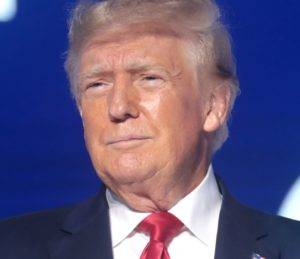Former President Donald Trump’s legal woes have taken a new turn as his lawyers argued before a New York appellate court on Monday, challenging the requirement for him to post a bond covering the entirety of his staggering $454 million civil fraud judgment while he pursues an appeal. Donald’s legal team contended that meeting such a demand was practically unfeasible given the circumstances at hand. The filing emphasized the impossibility of securing a bond equivalent to the judgment’s full amount and highlighted the financial strain posed by the collateral requirement, which stands at a daunting $557 million with accrued interest.
The judgment, which also extends to co-defendants including Donald’s company and key executives, casts a shadow of financial liability totaling $467.3 million. This ruling stems from a scathing decision by Judge Arthur Engoron last month, who found Trump and his associates culpable of orchestrating a long-running scheme aimed at deceiving financial institutions and insurers by inflating his wealth. Notably, the judgment comes with stringent restrictions on the business activities of Trump’s flagship entity, the Trump Organization, adding to the urgency of the appellate proceedings.
In a bid to forestall the enforcement of the judgment slated to commence on March 25, Donald has sought reprieve from a full panel of the state’s intermediate appellate court. However, his efforts to secure a more manageable bond amount, initially proposing $100 million, were rebuffed by appeals court judge Anil Singh. At the crux of Trump’s challenge lies the scarcity of bonding companies willing to underwrite such monumental sums, as underscored by testimony from a real estate broker enlisted for assistance. The affidavit submitted to the court underscored the rarity of bonds of this magnitude, typically reserved for corporate giants rather than individuals or privately held enterprises, further complicating Trump’s legal maneuvering.
Financial Strain Mounts as Trump Wrestles with Legal Dilemma
Donald Trump finds himself ensnared in a financial quagmire as he grapples with the repercussions of a landmark civil fraud judgment and the exigency of meeting stringent bond requirements amid ongoing legal wrangling. With the specter of a $454 million liability looming large, Donald’s legal team has adopted an increasingly confrontational stance, challenging the practicality and fairness of the appellate court’s demands. Central to their argument is the assertion that procuring a bond commensurate with the judgment’s magnitude presents an insurmountable hurdle, exacerbated by the dearth of bonding companies willing to extend such colossal financial instruments.
The intricate legal saga, which hinges on allegations of systematic deception spanning several years, has thrust Trump and his associates into the spotlight once more, underscoring the enduring ramifications of his tumultuous tenure in office. Judge Engoron’s scathing rebuke, which not only holds Donald accountable for fraudulent practices but also curtails the operational latitude of his flagship enterprise, portends a protracted legal battle fraught with financial peril. As the March 25 deadline for enforcement draws near, Trump’s legal team faces a race against time to secure a reprieve and avert the imminent specter of asset seizure and punitive measures.
Amidst the legal jousting and financial brinkmanship, Donald’s predicament serves as a cautionary tale of the perils that accompany unchecked ambition and ethical lapses. While the former president remains defiant in the face of legal adversity, the road ahead appears fraught with uncertainty, with the outcome poised to reverberate far beyond the confines of the courtroom, shaping Trump’s legacy and the broader discourse surrounding accountability and corporate governance in the highest echelons of power.
Trump’s Appeal and Legal Maneuvers
Former President Donald Trump has lodged an appeal on February 26th, contesting a recent defamation judgment against him. Following the ruling, Donald’s legal team swiftly moved to petition the Appellate Division of New York’s trial court, challenging the decision on grounds of alleged errors in law and fact, alongside claims of judicial overreach. Notably, Trump’s appeal did not necessitate an upfront payment or bond, nor did it automatically halt the enforcement of the original judgment.
Trump’s appeal strategy also involves exploring avenues to secure a stay on enforcement. While one option entails posting a bond equivalent to the judgment, Donald has opted to seek a stay with a bond for a potentially lower sum. This move underscores Trump’s assertion of substantial wealth, as he contends he possesses assets and liquidity amounting to several billion dollars, including $400 million in cash, in addition to various properties and investments.
Implications and Escalation
The defamation case, brought forth by writer E. Jean Carroll, stems from her allegations of sexual assault against Donald dating back to the 1990s. A jury recently ordered Trump to pay $83.3 million in damages to Carroll, augmenting a previous $5 million judgment from a related trial. With Donald having posted a bond covering the latter amount, attention now turns to the potential repercussions of the ongoing legal battle.
New York Attorney General Letitia James, a Democrat, has pledged to pursue asset seizure measures should Trump fail to meet the judgment obligations. This threat underscores the mounting legal and financial pressures facing Trump, as he navigates a series of legal challenges post-presidency. The outcome of Trump’s appeal, coupled with the specter of asset seizure, promises to shape the trajectory of one of the most high-profile defamation cases in recent memory, with implications extending beyond the courtroom and into the political and financial realms.
Table of Contents
Discover more from OGM News NG
Subscribe to get the latest posts sent to your email.














